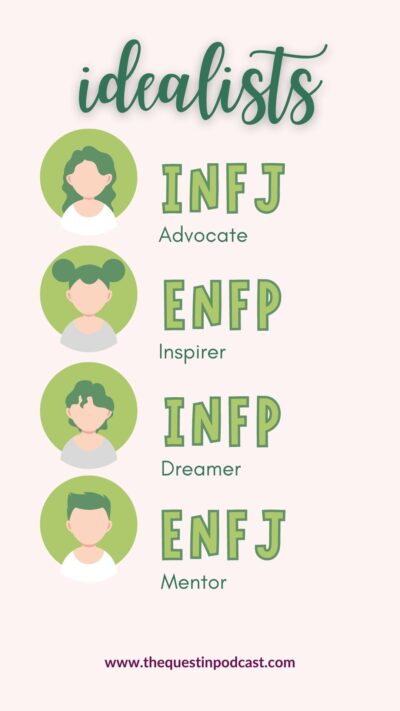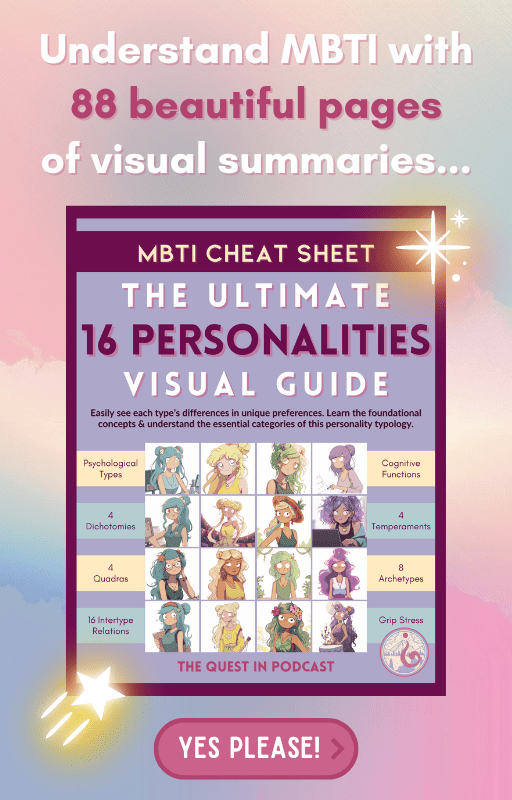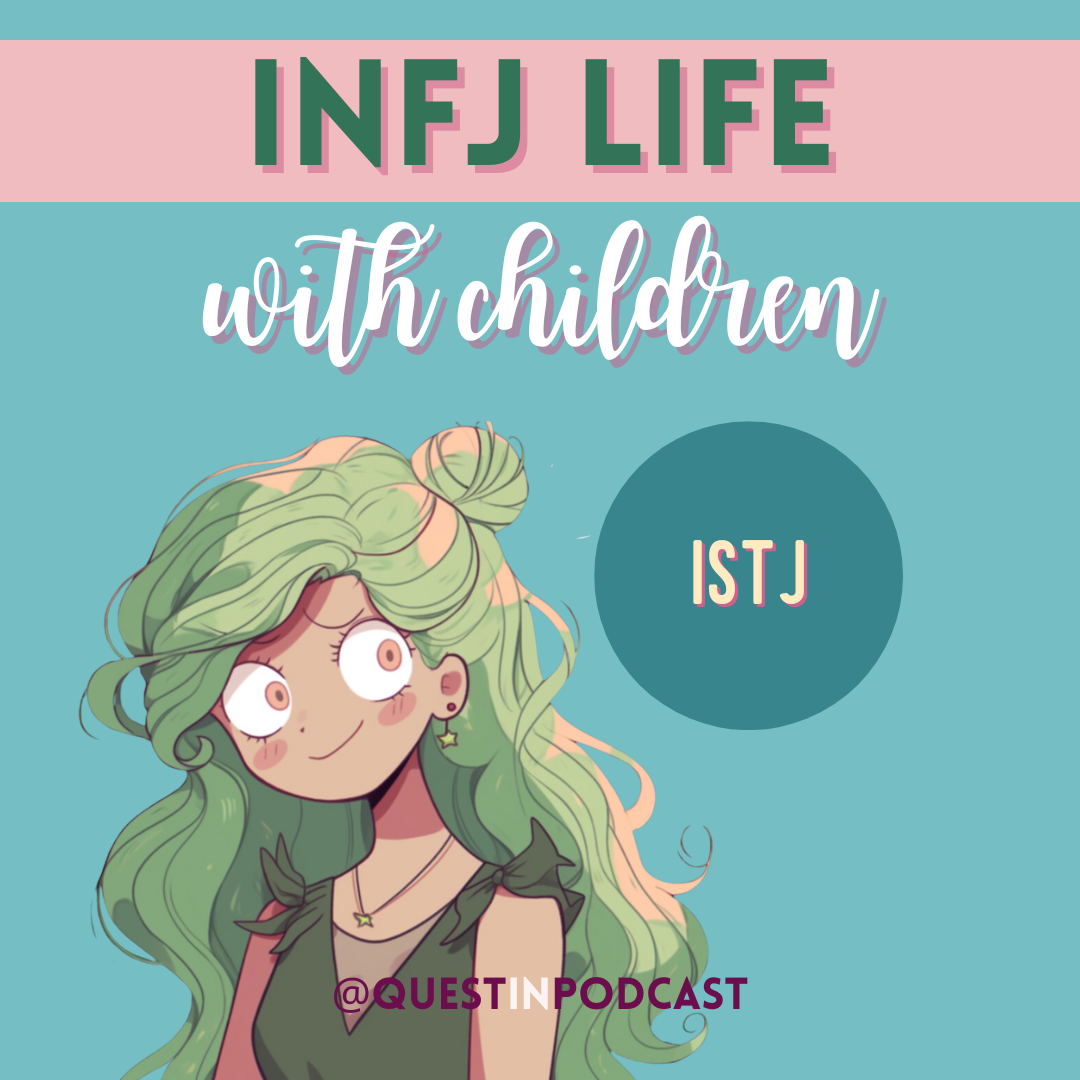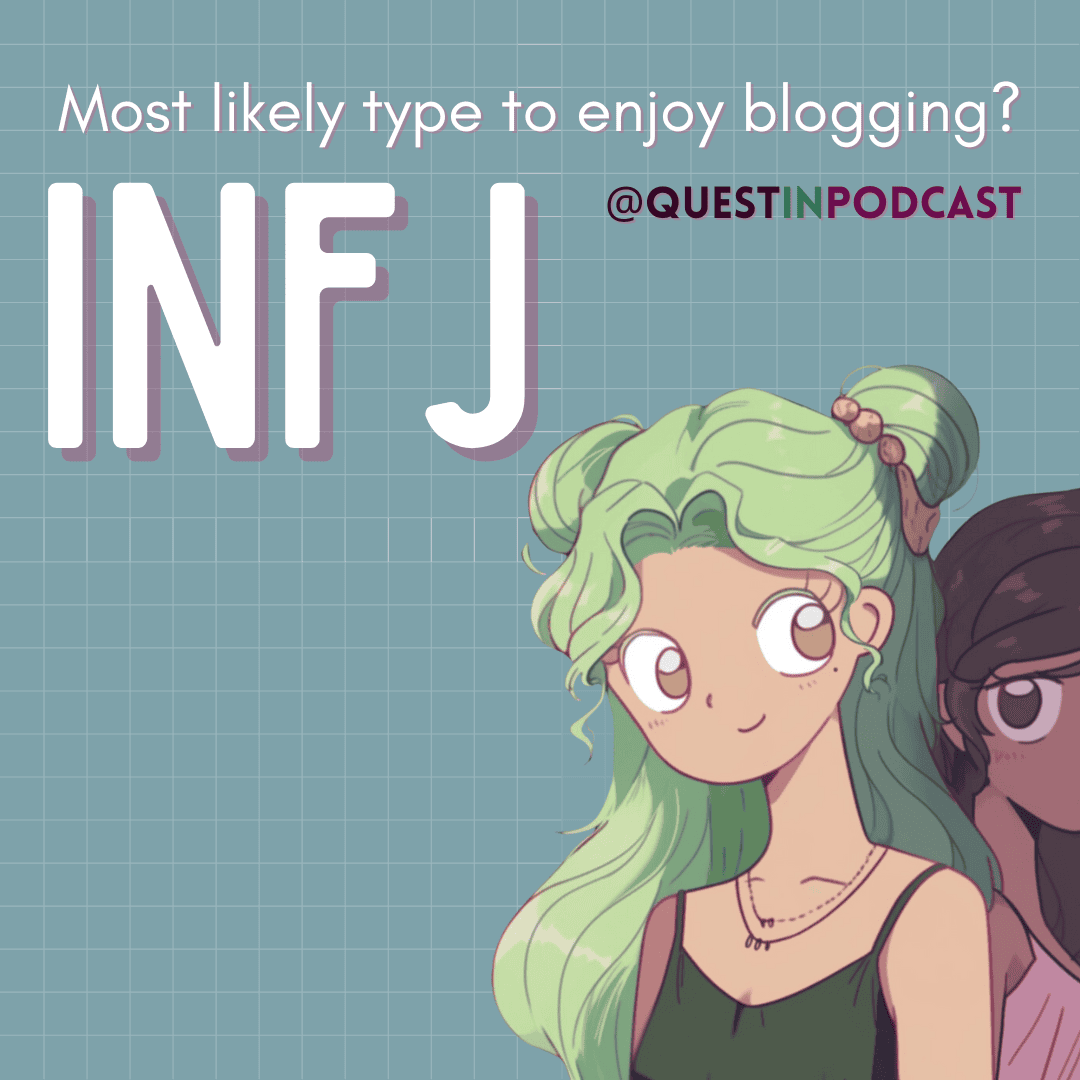
Idealist Temperament Personality Types: The NF’s (INFJ, INFP, ENFJ, ENFP)
Who are the Idealist Temperament Personality Types?
The idealist temperament personality types enjoy fostering personal growth and nurturing their personal relationships. They have a rich inner life and prioritize meaningful relationships and connections.

Idealists strive to develop their self-knowledge to properly understand themselves in hopes of eventually being able to help others. Idealists tend to have the core characteristics of genuine empathy, compassion, and kindness.
The Idealist Temperament
David Keirsey developed the Keirsey temperaments, which categorizes four temperaments. The other temperaments and personality types for each temperament are:
- Idealists (NF) = INFJ, INFP, ENFJ, ENFP
- Analysts (NT) = INTJ, INTP, ENTJ, ENTP
- Guardians (SJ) = ISFJ, ISTJ, ESFJ, ESTJ
- Artisans (SP) = ISFP, ISTP, ESFP, ESFP
The 4 Idealists in Myers Briggs Type Indicator (MBTI)

Estimated Percentages of Idealists in the General Population
From least common to most common Idealist personality types in Myers-Briggs:
- INFJ (Introverted, Intuitive, Feeling, Judging): Approximately 1-3% of the population
- ENFJ (Extraverted, Intuitive, Feeling, Judging): Approximately 2-5% of the population
- INFP (Introverted, Intuitive, Feeling, Perceiving): Approximately 4-5% of the population
- ENFP (Extraverted, Intuitive, Feeling, Perceiving): Approximately 6-8% of the population
Overall, the idealist temperament includes some of the rarest types in MBTI.
Understanding the Idealist Personality Type
Idealist Temperament Meaning
In this book, Linda V. Berens summarizes Idealists (“Catalysts”) as people that…
“Want to be authentic, benevolent, and empathic. Search for identity, meaning, and significance. Are relationship-oriented, particularly valuing meaningful relationships. Tend to be idealistic and visionary, want to make the world a better place. Look to the future. Trust their intuition, imagination, and impressions. Focus on developing potential, fostering, and facilitating growth through coaching, teaching, counseling, and communicating. Generally are enthusiastic. Think in terms of integration and similarities and look for universals. Often are gifted in the use of metaphors to bridge different perspectives. Usually are diplomatic. Frequently are drawn to work that inspires and develops people and relationships.” – Linda Berens, 2010

Idealist Personality Pattern
Core Needs: Idealists desire self-realization and integrity
- Meaning and significance (purpose)
- Unique identity
- Consistent self-improvement
Values: Idealists desire to work towards a greater good for a better world
- Empathy, unity and cooperative interactions
- Morals and ethical behavior
- Personal authenticity and personal integrity
- Self-actualization through growth and development
- Meaningful communication
Idealist Temperament Strengths and Weaknesses

Idealist Personality Strengths
- Natural ability to imagine future possibilities and the bigger picture
- Promotes personal development in themselves and in others
- Feel strongly dedicated to continually learning self-knowledge
- Mentoring types desire to develop others effectively
- Advocating types strive for social justice
- Ability to warmly connect with many different personalities
- Excel to perceive emotions and motivations of people
- Consider circumstances from a holistic view
- Strong personal values, including optimism, dedication, and personal authenticity
- Can discuss at great lengths about human nature, observations, and needed improvements
Idealist Personality Weaknesses
- Sometimes loses sight of having realistic expectations of the world
- Stressed by experiences of insincerity, betrayal, and loss of meaning
- When stressed, Idealists tend to disassociate and may even act disingenuously against their own emotions

What Idealist temperaments need in times of stress: affirmations and support (from others and from themselves).
Additionally, finding new sources of meaning will greatly help idealist temperaments in times of stress.
Career Paths for Idealists
Many idealists are naturally drawn to helping professions. Idealists tend to genuinely care for the well-being of others and desire to make the world a better place.
The ability of idealists to imagine the big picture and future possibilities makes the idealist personality type have a natural talent for growth and development. If they can find careers where they can be focused on people and satisfy their core values, then idealists will feel that they have found their purpose in life.
Idealists strive to make a positive impact in the world. The idealist temperament desire careers that are filled with excitement, motivation, and feelings of meaningful improvement.

Idealists will definitely enjoy working with other idealists when possible. Other idealists will share the same desire to positively influence the world.
What jobs are good for Idealist temperament?
People-oriented careers can be deeply fulfilling for idealist personality types. Some ideas are mentoring, counseling, diplomacy, and teaching. Idealists tend to be relationship-focused and enjoy facilitating personal growth in people. They are future-oriented, enthusiastic, and inspiring personality types.
Traditional careers in life may include HR-type roles in a company. A traditional role requires conformity, which some idealists might find boring and unenjoyable.
However, I notice emerging careers possible for many idealists nowadays as a result of the internet age. These new possible careers for idealists include selling courses, creating content, and offering coaching. Obviously, these are more entrepreneurial careers in life but many idealists find success pursuing such business ventures.

Idealists are special persons that can really transform people in incredible ways.
The 4 Personality Types of the Idealist Temperament
The INFJ Personality Type

INFJ personality types are sometimes nicknamed the “Mystic”, “Sage”, or “Counselor.” Here I refer to them as the “Advocate” personality type.
The INFP Personality Type

INFP personality types are sometimes nicknamed the “Healer”, “Mediator”, or “Empath.” Here I refer to them as the “Dreamer” personality type.
INFP strengths include their easygoing attitude, empathetic nature, and incredible imagination. INFPs focus on emotional and mental connection with someone who aligns with their core values in order to feel any spark in intimate relationships.
In their personal relationships, this personality type desires harmonious relationships. INFPs tend to respect everyone’s personal space and have a strong sense of right versus wrong. From time to time, INFP personality types can feel extremely sensitive and maybe even considered a highly-sensitive person (HSP).
The ENFJ Personality Type

ENFJ personality types are sometimes nicknamed the “Protagonist”, “Teacher”, or “Giver.” Here I refer to them as the “Mentor” personality type.
The ENFP Personality Type

ENFP personality types are sometimes nicknamed the “Campaigner”, “Encourager”, or “Champion.” Here I refer to them as the “Inspirer” personality type.
What is a Personality Temperament?
Temperaments are recognizable common patterns amongst groups of people. For at least the last 25 centuries, observers of human behavior have identified four common distinctions historically in the world.
Hippocrates in 450 BC named these four temperaments to be choleric, phlegmatic, melancholic, and sanguine.
- “Choleric” = Idealist Temperament
- “Phlegmatic” = Analyst Temperament (also referred to as the Rational temperament by David Keirsey)
- “Melancholic” = Guardian Temperament
- “Sanguine” = Artisan Temperament
Temperament is innate, constant, and drives behavior…
A temperament pattern will influence the skills that a person is naturally drawn towards developing, showing which talents develop more easily. This pattern governs growth through distinct themes of specific needs and core values. People are energized when their core needs are met and experience truly high functioning as a result.







